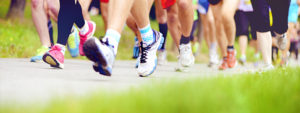 A runner’s diet isn’t always the healthiest, and the combination of high sugar and processed food combined with exercise, means that many runners suffer some form of gut trouble. In the following article I will be discussing how to choose foods that soothe and strengthen the gut and what to avoid to ensure everything works smoothly.
A runner’s diet isn’t always the healthiest, and the combination of high sugar and processed food combined with exercise, means that many runners suffer some form of gut trouble. In the following article I will be discussing how to choose foods that soothe and strengthen the gut and what to avoid to ensure everything works smoothly.
There has been much focus on the gut microbiome recently as we now know that it plays a central part in immunity and wellbeing. The gut microbiome is essentially the balance of bacteria that resides in your digestive system. There are good bacteria and bad bacteria coexisting within this delicate ecosystem and an imbalance can quickly make us feel pretty awful. When the bad bacteria outnumber the good bacteria, we can suffer gastric distress such as cramps, diarrhoea, constipation, bloating and flatulence which ultimately affects our emotional balance and performance. This is further complicated by stress and anxiety and even the motion of running in itself can increase symptoms.
So, as a runner I’m sure the last thing you want affecting your performance, especially on race day, are these kind of symptoms. Therefore it’s imperative that we do what we can to keep the gut bacteria in balance.
The foods and lifestyle choices that can affect the gut are inflammatory in nature and each person has an individual tolerance to these:
- Processed food
- Artificial sweeteners
- Refined sugar
- Alcohol
- Recreational drugs
- Some prescription drugs
- Caffeine
- Stress
For optimum well-being I would recommend that you reduce or eliminate all of the above to ensure that your gut has the best chance of remaining calm and healthy. That in itself massively reduces inflammation and strengthens your digestive health. Easier said than done though I know! Any steps you can take towards reducing the burden on your gut will have a positive impact..
In addition, there are many things we can do on a daily basis to soothe and rebuild the gut.
- Add herbal teas to your daily fluid intake. I’m a big fan of the Pukka tea range which include large doses of antioxidants and anti-inflammatory nutrients, for example, Pukka Turmeric Gold, Pukka Mint Refresh and Pukka Elderberry & Echinacea.
- Add probiotics to your diet which boost the population of good bacteria in your gut. I really like the brand, Nourish Kefir. It’s a milk-based drink which contains billions of live bacteria. If you’re dairy intolerant, I recommend Rhythm Pure Coconut which is a kefir made from coconut milk.
- Ensure you’re getting plenty of fibre ideally from fruits, vegetables, sweet potatoes and gluten free grains such as brown rice, quinoa and gluten free oats.
- Include essential fat such as avocado, nuts, seeds, olive oil and if you eat fish, then particularly oily fish. Oils have a soothing and nourishing effect on the gut and help strengthen the gut lining.
- Be sure to get plenty of protein in your diet which repairs, builds and strengthens our cells. The amino acid, Glutamine has been shown to be especially helpful in gastrointestinal health, as it’s a key nutrient used by the body to rebuild and repair.
For further reading, I recommend Dr Michael Mosley’s latest book, The Clever Guts Diet and his accompanying recipe book. He shows you how to ‘reboot your biome’ with a 2 stage healing process. He also has some YouTube clips on the subject.
5 foods/drinks to avoid on race day
Race day is often the biggest concern that I hear from my clients with regards to digestive balance. Due to the nature of excitement and possibly anxiety which can upset the balance of the gut, it’s important to ensure that we’re not over-exciting the gut with inflammatory foods at the same time.
- Caffeine – know your tolerance. Caffeine increases peristalsis (the rhythmic movement of the intestines) and can make you run for the loo if you have too much!
- Foods high in fat such as, bacon, sausages and pastries. These foods are inflammatory due to the processing, and take longer for the body to digest which can make you feel sluggish.
- Refined sugar – a sudden dumping of refined sugar into the bloodstream can cause an initial high which makes you feel ready to race but is shortly followed by a low which can hit you during the race and make you perform worse.
- High fibre processed cereals such as Bran Flakes. Wheat bran in particular can be abrasive on the gut lining and trigger bloating, cramps and flatulence.
- Pre-workout supplements. Be particularly careful with the use of these. They often contain artificial sweeteners and aggressive stimulants which can cause chaos in a sensitive gut and make you feel drained after the race, interfering with recovery.
Did you know?
Optimal balance of the gut microbiome can knock minutes off your running times. If you’ve done everything you can in training, ensuring you get adequate rest and taking steps to ensure your stress level is kept in check, eating the right type of foods and avoiding the ones that upset the balance is the final step in reaching your personal best.


